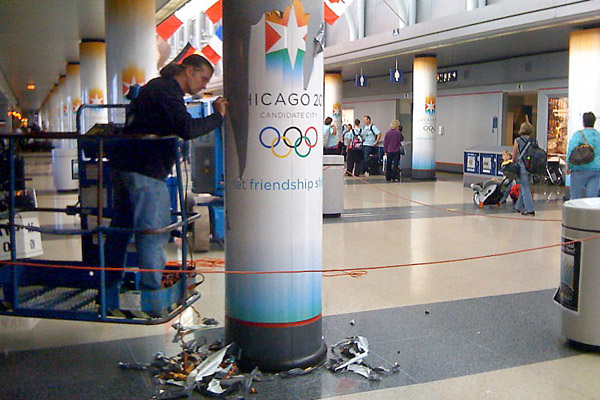One thing that's come up in the wake of the G8 summit being moved from Chicago to Camp David is the ghost of Chicago's failure to get the Olympics:
After the 2016 Olympics stumble, in which Chicago finished dead last, the summit could have brought a measure of redemption.
I'm skeptical of using big-time events as yardsticks for a city's global competitiveness or general well-being. The G8 summit, for example, usually goes to small resort towns, so Chicago getting it was something of a surprise. The process of getting the Olympics, meanwhile, is so opaque (and occasionally corrupt) that it seems like an irrational metric for measuring the economic and political health of a city or region. The going theory for why Rio landed the games, for example, was that no South American city had ever hosted them, which is nothing we could have done anything about. Other posited theories included IOC-USOC conflict and visa problems; again, things well outside the city's control.
Flogging ourselves over perceived stumbles or failures regarding things as mysterious as the Olympics strikes me as a fool's errand, not least because the conventional wisdom among economists is that they end up being a financial burden at best, and a disaster at worst. When I was a kid I went to Montreal to see an Expos game at "The Big Owe," the vastly-overbudget Olympic Stadium that got paid off around the time it lost its final reason for existence; graceful tower aside, it otherwise made the Metrodome look like Wrigley Field.
So I was surprised to see a study today, via Nate Berg, that challenges that conventional wisdom—but not entirely. It's a paper by Andrew Rose of Berkeley's Haas School of Business and Mark Spiegel of the San Francisco Fed: "The Olympic Effect." The thesis:
This paper examines the possibility that both sides of the argument may be right. In particular, we show that there is a large economic benefit associated with mega-events (justifying the public’s enthusiasm), despite the fact that much of the requisite new infrastructure is a net cost (explaining the skepticism of economists).
As usual, the arguments against are that the expenses are tremendous, and for the most part are on things that leave no lasting impact (security costs) or are difficult to repurpose in cost-effective ways (infrastructure). The arguments for are that it's a sign of world confidence and brings a difficult-to-quantify good feeling. The authors are confident that they were able to quantify the latter:
We explore the possibility that bidding to host an international mega-event such as the Olympics is part of a costly strategy that signals trade liberalization and results in increased openness. We develop a theoretical political-economy model consistent with this conjecture. In the model, we obtain a separating equilibrium where bidding to host a mega-event provides a positive signal about future policy intentions.
In other words, they decided to actually try to define and locate the warm-fuzzies associated with the Olympics (and the World Cup, and international expositions). And they found it, and saw that it was good.
But, and it's a big one (emphasis mine):
However, consistent with our empirical findings, hosting the games in and of itself has no impact on a nation’s fundamentals or trade.
Think of it this way: say you've moved to a new apartment, and you invite a bunch of people over for a housewarming party, and not many people show up. The natural reaction is to get really depressed, because it means no one likes you. (Well, it's my natural reaction.) The authors quote fellow Olympics failure Jean-Francois Legaret, mayor of Paris's first arrondissement, who didn't get the 2012 Olympics: "Somehow, the good name of France seems to be at issue, and that makes the defeat even worse."
But there could be a lot of reasons: a couple people were sick, some were out of town, the weather turned, and so forth. What matters is that you connected with people, and they know you want to party. It doesn't mean that your big party will work out, but it keeps the lines of communications open. Plus, you don't have to buy mixers or clean up vomit afterwards.
The authors call this signaling:
Our results suggest that the Olympic effect on trade in the data is not associated with hosting the games but rather from bidding for them; bidding to host the games seems to send a signal that has a sizeable trade-expanding effect. In this section, we develop a political-economy signaling model consistent with this result. Our model is of the “burning money” type. In keeping with our empirical results, we assume that countries that intend to pursue liberal trade policies in the future can signal this intent by engaging in the costly activity of bidding to host the Olympic Games. The payoff for sending this signal is that countries which expect to liberalize receive increased investment in the export sector (the sector whose prices are raised by liberalization).
And argue that it's rational in its irrationality:
The motivation for hosting a mega-event like the Olympics seems elusive to economists. Plausibly measured net economic benefits are rarely large and typically negative; claims of non-economic benefits are difficult to verify. Yet in practice countries compete fiercely for the right to host such events. Why? This paper identifies one potential explanation; countries that host the games enjoy a substantive permanent increase in trade – the “Olympic Effect.”
Their model is based on national outcomes, not regional. But it does suggest the possibility that the loss of the Olympic bid is far from the agony of defeat: it might be the optimal outcome.



